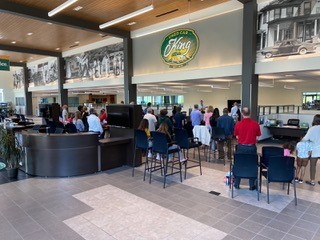Decentralization does not sound like a critical theological term. It feels more like an organizational or leadership term you’d find in a TED talk. The New Testament says over and over again that the people of God have now become the temple of God because of what Christ has accomplished on their behalf. The people of God are the place where God’s Spirit now dwells on the earth and He has empowered them to live faithful lives of worship, to serve God’s purposes and to represent Him everywhere they go. Decentralization cooperates with that reality. Rather than relying solely on the large, concentrated efforts of the church that so many of us are used to, a decentralized structure allows for small clusters of God’s people to move freely about the community, serving one another and the world around them, representing Jesus where they live, work, and play in.
We have known this to be true since our inception. We have been committed to fleshing this out in our structures, whether they be small groups or church planting partnerships and strategies. But when Covid-19 broke out and the lockdowns happened, we recognized that God had wonderfully prepared us, and many congregations around the world like us, for this type of event. As gatherings and programs were cancelled, there were many things to consider. How do we continue to decentralize and get smaller? Not smaller for smaller’s sake, but how do we continue to move forward even as people are shut up in their homes, scared and worried? How do we see this as an opportunity to continue to mobilize the Church? Pushing towards greater decentralization was, and is, turning out to be one of the answers.
Why? While the structure itself does not guarantee success, it does create significantly more opportunity in four key areas. First, decentralization necessitates that our leaders are always equipping and releasing more leaders. As more and more ministry is given away and more and more groups and congregations begin, we have needed and will continue to need more and more men and women to lead others. This requires investment and time in the lives of many potential leaders who may grow into faithful leaders of new groups, ministries, and churches.
Second, there is an increased participation in the life of faith and ministry of the Church (priesthood of all believers), with a focus on a decentralized structure—not merely an assimilation strategy designed to increase the congregation. The hope is that as people are maturing in Christ that they will be used by Him to be a blessing to one another, as well as to the world around them. Decentralized structures necessitate more people who are willing to invest some part of themselves and their grace stories into the lives of others.
Next, decentralized structures should lead to the multiplication of churches or expressions of the Church. This happens as groups understand that they are not an end in themselves, but that each group, ministry or congregation has the opportunity to multiply in one or many new expressions as God gives growth. As they do multiply, this leads to the fourth and final key area of success: increased accessibility to the gospel in our geography as a result of the previous three. As we push forward in decentralizing, these new structures have greater proximity and access to people in need of the gospel.
 As Covid-19 moved across New York State and lockdowns happened, we moved to increase participation in our decentralized structures. How could we get more people into our small group environments? Our leaders spent more time investing in leaders, beginning new groups. As we moved towards regathering we opened up two new locations, with simpler services so that more people could serve and lead. There are now more access points into the life of the congregation than before.
As Covid-19 moved across New York State and lockdowns happened, we moved to increase participation in our decentralized structures. How could we get more people into our small group environments? Our leaders spent more time investing in leaders, beginning new groups. As we moved towards regathering we opened up two new locations, with simpler services so that more people could serve and lead. There are now more access points into the life of the congregation than before. As we move forward time will tell what the results will be. We look at where we were and are grateful for all that God has done over the years in and through the work at Missio. But now we see an opportunity to continue to decentralize further. To train more and more leaders. To give opportunity for even more participation in the life of the church. To multiply in new ways and new places, thereby creating new access points throughout Central New York.
by Jordan Stinziano and Adam Bregou, Missio Church
